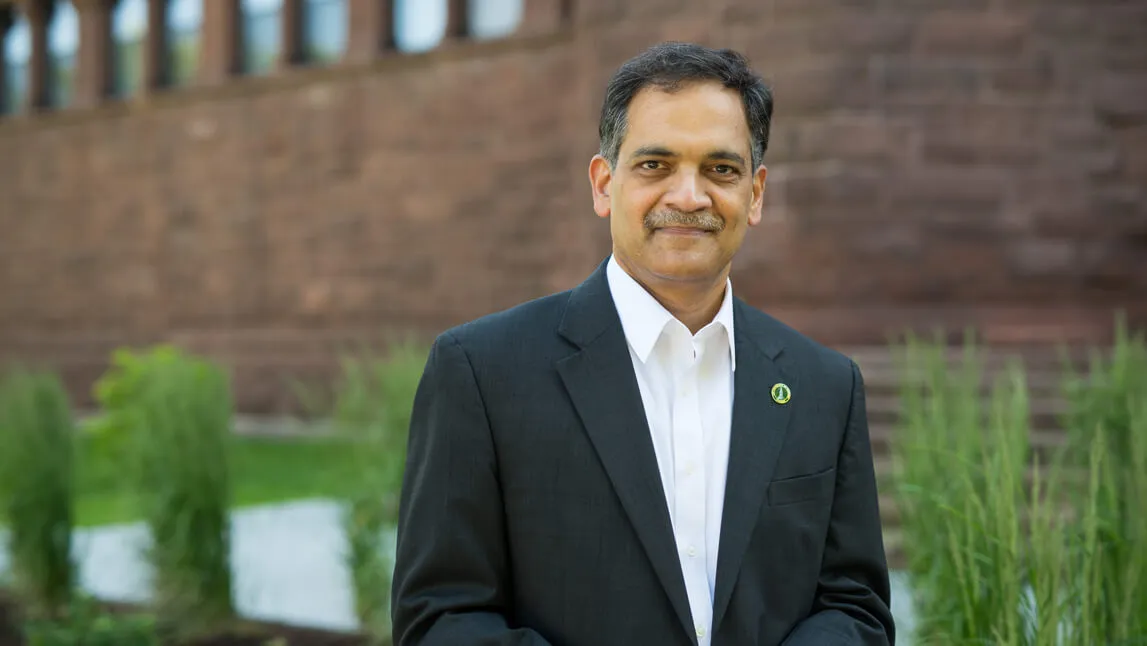UVM’s faculty and staff are always considering new ways to ensure student success—the theme of this edition of the magazine and one of the university’s three strategic imperatives.
Most agree that graduating in a timely manner, securing gainful employment, or pursuing graduate education are evidence of success.
But there are other critical elements. One of those is making sure students learn to engage others on important topics, thorny topics, controversial topics.
If you believe, as I do, that part of a university’s mission is to empower future generations to steward our democracy, our country is doing a poor job in this area. Indeed, the failure to find common ground visible in national news is mirrored—sometimes fostered—on college campuses.
These bleak implications for the future led Honors College Dean David Jenemann and me to try an experiment. What if we provided students an opportunity to talk with leaders and “real world” experts about polarizing societal challenges in a spirit of honesty, creativity, curiosity, and civility?
We launched a class last semester that challenged our students to understand and incorporate multiple points of view to formulate workable solutions to current topics of national debate.
Evoking F. Scott Fitzgerald, we tested our students’ “first-rate intelligence” by asking them “to hold two opposing ideas in mind at the same time and still retain the ability to function.”
The students passed with flying colors! They engaged with one another energetically and openly, willing to consider other points of view, to be proven wrong, and to revise their beliefs in unexpected ways.
In fact, multiple students urged us to “bring it on!” when proposing future topics. Some felt that more controversy and disagreement would let them exercise more of their new capabilities—constructive, civil dialogue aimed at making the world a better place.
We had a few surprises along the way. The first—a pleasant one—was their sizable appetite for tough conversations. When we put out the call to fill our roster of 12 we found 150 students eager to join.
And while enthusiasm exceeded our expectations, a less-welcome surprise was that they generally knew much less than we expected about issues of contemporary importance like the environment, individual rights, and impact of social media—even when they were highly passionate about such topics. In fact, in each of our sessions some students confessed they didn’t know much about topics on which they held very strong opinions.
This realization led to another surprise: our students’ request for more discussion and argument in all their classes.
About midway through the semester, one student asked, “Why haven’t we had to learn this stuff? Why isn’t there a required course where we talk about issues and learn their historical contexts and complexities?”
Simultaneously, we responded, “You mean, like a civics class?”
It was clear the instant we said “civics” that our students had no idea what these two middle-aged guys were talking about.
Which leads us to our biggest takeaway: It doesn’t take much beyond a room, some guidance, and maybe a sandwich to get students to reconsider some firmly held positions, listen to one another, and engage in constructive dialogue.
By semester’s end, our students were really good at arguing, pushing us just as we had pushed them. They told us about their private chat group where they continued their conversations after class—without including the two of us, of course.
That’s as it should be. We’re in the business of preparing young people to succeed us and exceed us after we’re gone.
In short, we must provide students practice and training in democracy, just as we expect them to master other important skills. Public universities like UVM are uniquely situated to accomplish this goal. I believe it’s in our mandate to do so for the public good.
While our small experiment by itself isn’t going to change the quality of national debate, imagine the impact if every student learned and practiced civil discourse the way they study writing or math—talking to people from different backgrounds about challenging subjects like guns, reproductive rights, or systemic racial inequities before stepping out into the world to do it for real.
Our class was well worth the effort – effort we’d love to see our colleagues elsewhere make. We will continue to do our small part and challenge others to do the same.
Student success depends on it. Our democracy depends on it.
